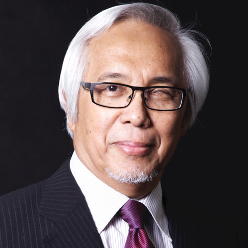
Tan Sri Prof Zakri Abdul Hamid
Founding Member of INGSA and Patron of the INGSA-Asia Chapter
Former Chair of the Southeast Asia Science Advice Network
Prof Zakri Abdul Hamid is a champion of the environment and a passionate advocate for sustainable development. He is currently the Founding director of the International Institute for Science Diplomacy and Sustainability at the UCSI University
A former member of the prestigious Scientific Advisory Board to the UN Secretary-General Ban Ki-moon and former Science Advisor to the Prime Minister of Malaysia (2010–2018), Prof Zakri trained as an agricultural scientist and earned his PhD in 1976 at Michigan State University, United States. He was appointed as a science expert in the Malaysian delegation for the Convention on Biological Diversity (CBD) (now known as the UN Biodiversity Treaty) which was signed during the 1992 Earth Summit, and was elected Chair of the CBD’s Subsidiary Body on Scientific, Technical and Technological Advice (1997 – 1998). His presence on the global stage coincided with a strong movement to leverage scientific evidence for policymakers and politicians to develop sound policies and strategies in solving global challenges such as climate change, biodiversity loss and ecosystem destruction while trying to alleviate socioeconomic challenges such as poverty, adequate food, healthcare and proper sanitation.
Prof Zakri is also known for his work as co-chair of the 2005 UN Millennium Ecosystem Assessment (MA), one of the world’s largest-ever scientific collaborations involving over 2,000 leading scientists from 95 countries. The MA produced a report on summaries and guidelines which significantly contributed to raising awareness among global leaders on the relationships among living organisms, as well as the interdependence between life and the environment. From 2001 to 2008, Prof Zakri was the Director of the Institute of Advanced Studies at the United Nations University (UNU-IAS) in Tokyo, Japan, and contributed towards the setting up of The United Nations Sustainable Development Goals (SDGs). He also inspired and initiated the landmark Japan Satoyama Satoumi Assessment (JSSA) for the Satoyama Initiative, a joint effort between the Ministry of the Environment of Japan and the UNU-IAS to promote socio-ecological production landscapes.
The excellence of the MA and the JSSA led to the establishment of the United Nations Intergovernmental Science-Policy Platform on Biodiversity and Ecosystem Services (IPBES), of which Prof Zakri was elected as founding Chair. Created to bridge the gap between scientists and policy makers to enable the formulation of better policy response in managing biodiversity, the IPBES is now recognised by both the scientific and policy communities as an authoritative platform to address existing gaps and strengthen the science-policy interface on biodiversity and ecosystem services. Prof Zakri was also a member of the Global Leadership Council of the UN Sustainable Development Solutions Network (SDSN) during the run-up to the 2015 UN Summit.
A founding member of INGSA, Prof Zakri is also the Patron of the INGSA-Asia Chapter. He was the Chair of the pilot Southeast Asia Science Advice Network (SEA SAN), which worked to structure and strengthen direct evidence-to-policy making pathways in the region through knowledge-sharing between senior-level decision makers and their equivalents. Prof Zakri is also presently the Chairman of Atri Advisory, a consultancy company advising governments, regional bodies and international organisations on science and technology for sustainable development, conservation and sustainable use of biodiversity.

